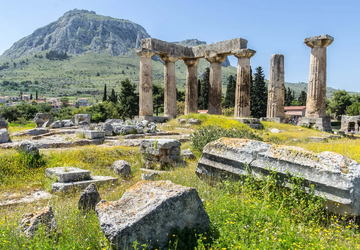
4 Tips for Exploring Ancient Ruins in Greece
sana
Travelers from all over the world visit Greece because of its captivating ancient ruins. Whether it's the famous Acropolis in Athens or the mystical Oracle at Delphi, these archaeological wonders unveil a captivating world shaped by ancient Greek civilization.
This is a trip between eras, where one follows legendary people's footsteps and discovers the secrets of a world long lost in the mists of time.
So it's essential to plan to maximize your experience visiting the ancient ruins of Greece.
In this travel blog, we are sharing four tips that will make your journey through Greece's past the most enlightening and unforgettable.
Whether one is traveling to learn or just for fun, one needs advice on how to make their journey worthwhile through a guide to the ancient ruins.
Find out how to have the ultimate ancient Greek adventure below!
Why Exploring Ancient Ruins is a Must?

There is nothing like the ancient ruins in Greece—a way to dig right into the texture of its past, history, and culture.
Through these archaeological sites, man gets an arm into the past and can witness the monumental achievements of the civilization known as ancient Greece.
Exploring these ruins allows you to marvel at the incredible architectural skills of the ancient Greeks: the high columns of the Parthenon and the delicate and detailed mosaics of Delphi—only the start of awe-inspiration.
Walking by those ancient stones gives one a better appreciation for the ingenuity and artistry of this remarkable society.
Besides, exploring ancient ruins in a foreign land broadens the experience; in fact, it gives an idea of how modern landscapes in Greece evolved with time.
Taking some time to learn about Greece's distant past will definitely enrich your trip and leave an impression in your memory.
4 Tips for Exploring Ancient Ruins in Greece
Now that you have realized the value of exploring the ancient ruins of Greece, it's time to give you some tips so that your exploration becomes a memory that lasts a lifetime.
In this section, we have elaborated four critical strategies to fully optimize your experience and learning.
1. Plan Your Visit Ahead of Time
Planning is the proper preparation if you want to see more of the ancient ruins in Greece.
Research the sites that interest you and visit them for their historical significance, worthwhile artifacts, or features. Check the opening hours and ticket entrance fees. These usually vary with the time of year and the location.
You might also visit them during the morning or late afternoon to avoid people and enjoy the serenity of the moment.
It is good to plan your program so that you feel prepared for the time and are clearer about the number of sites that can be covered in a single day.
2. Hire a Knowledgeable Guide
Although it is always possible to visit the ancient monuments alone, a guide who knows as much as one does can make the experience even richer.
Hiring a local who is a student of Greek history and archaeology can get knowledge to fill in all those details one may ignore.
Look for the one that travel forums or local tourism offices recommend to get someone trustworthy and able to prepare a plot according to your tastes.
Another option is to do a group tour if you want a more vibrant or friendly visit.
A nice guide will transport you back to the period of the ancient world through interesting stories and informative anecdotes; hence, the experience will be both educational and entertaining.
3. Wear Comfortable Clothing and Footwear
Walking on relatively uneven terrain might be necessary, and given the large surface area covered, proper footwear is recommended for this activity.
Make sure to choose lightweight, breathable clothes that give you the freedom to move around with ease and stay cool under the Mediterranean sun.
Opt for strong and comfortable walking shoes or hiking boots that have a good grip to prevent slipping on rocky surfaces.
Remember to bring a hat, sunglasses, and sunscreen to protect yourself from the sun, as many ancient ruins don't have much shade available.
4. Respect the Sites and Follow Regulations

Remember, visiting these ancient ruins is really important for history. It helps protect them from becoming too damaged over time.
Read all the signs posted by each site and follow the indications about taking pictures, for example, or about entering an area.
Remember, even small acts like touching or climbing on structures can have a significant impact over time. These actions can lead to erosion and damage, so it's important to refrain from such behavior.
Respect the site and do not let any piece of trash ruin the beauty and appearance of the site.
By doing so, you will respect ancient marvels like the Great Wall, contribute to their preservation, and allow future generations to have a beautiful experience as well.
Embark on Your Greek Adventure Today
These four tips will set you for a thrilling experience of Greece's history. So, come on, let's experience the grandeur of all these places firsthand.
You will always be able to remember the awe-inspiring, life-inspiring experiences travelers have in the Greek ruins.
Get planning your Greek adventure today and make some memories that will last a lifetime! Those tips prepare you to experience the marvels of Ancient Greece and learn more about this interesting civilization. Your dream vacation awaits!
Frequently Asked Questions
Q. Name some of the ancient ruins in Greece that are a must-visit?
Ans. Among the iconic ancient ruins in Greece are the Acropolis in Athens, Delphi, Olympia, Mycenae, and Knossos. Each visit illuminate’s ancient Greek history, mythology, and culture.
Q. How do I find a reputable guide for my trip?
Ans. Find a reputable guide on travel forums, at the local tourism office, or through your hotel concierge. In case you like, any guides must be knowledgeable about Greek history and archaeology and have a look at reviews left by people who have used their services previously.
Q. What should I bring when visiting ancient ruins in Greece?
Ans. Thoughts of visiting an ancient site in Greece should include comfortable walking shoes, breathable clothes, a hat, sunglasses, and sunscreen. Remember to bring water, snacks, and a camera to take pictures to keep those memories.




